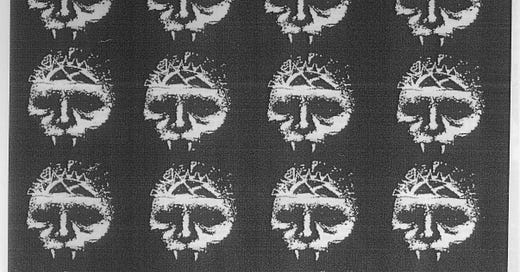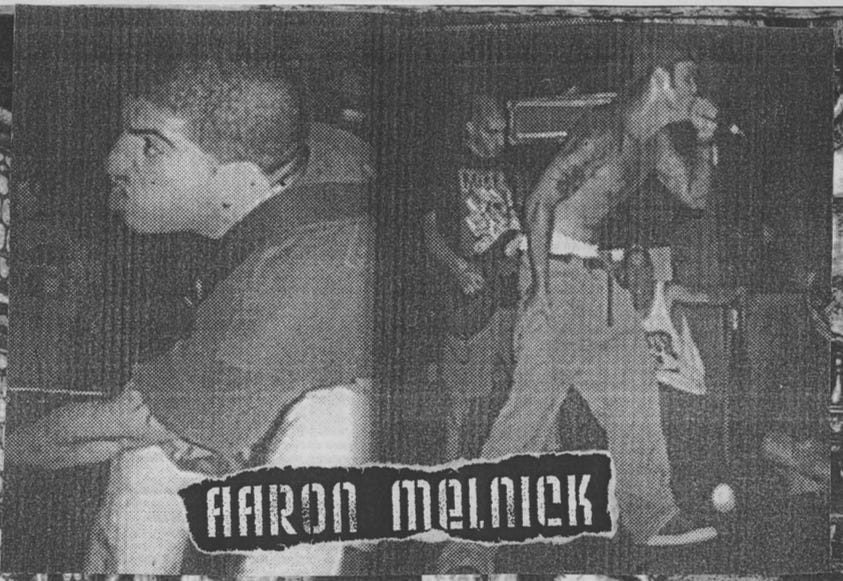Distort #7 (2005)
Written, designed and published over the course of one frantic sleepless weekend, this was the first issue of Distort to print more than a handful of copies. You can order the PDF of this issue here. Alongside the following features, there’s a piece on top 5 underrated USHC by Voices Wake Us editor Ben Parker, a top 5 Cleveland hardcore punk and rnr rundown from your humble editor, and a guide on how to kill a man by the myth and the legend Adel 156.
Integrity
The first full length issue of Distort included an interview with Integrity guitarman Aaron Melnick. Do you hear Integrity? Cleveland hardcore band from the late 80’s, started as straight edge thug hardcore and evolved into something strange and unprecedented, absorbing interests in Gnosticism, terrorism and heavy metal. Their mid 90’s records are exceptional.
Integrity were a corruptive influence in my youth. The severity of the hatred, the lust for violence and the disturbing affection for deathcults were an extreme affront to the friendship and community hardcore that I suckled onto as a child. There was also an escapist element that allowed me to look at Wollongong and picture sarin gas attacks on trains packed with smack dealers. Drug war fantasies of a teenage teetotalitarian.
In 2005, Integrity were offering substandard reunion records, a case study of the debilitating sickness of soft-brained nostalgia turning a music based in hatred for society into something for Hillsong nerds who prayed to the gods their parents prayed to, voted for the parties their parents voted for, and collected shoes, cartoon figurines and coloured vinyl to express they weren’t the boring Boomers their parents were. Straightjacket had a song about these people called ‘Herdcore’, about midwit hardcore, cow music for cowmane.
I got in contact with the original Integrity guitarist and song writer, Aaron Melnick, to get a history of the band from before the reunion, to counter herdcore Integrity. Aaron Melnick’s style defined the band at their peak, and the work he did following leaving Integrity with Inmates, In Cold Blood and Brainwashed Youth are recurrent corruptions. Particularly Inmates – this band above most anything captured my imagination at the time of this issue of Distort.
Integrity
Response from Dwid
I posted a polemic against nu-Integrity in some obscure corner of the internet. Dwid sent me an email expressing his feelings on my diatribe. I printed an extract in Distort.
Dwid was a brutal shit talker and brilliant troll of the placid 90’s hardcore scene, and the fact he was ripping off a bunch of naïve cows with his substandard reunion records doesn’t bother me at all today. In fact, compared with much of the time and much that has come since, 2005 Intgerity doesn’t sound all that bad.
I come across as an uptight pedant in much of these early issues… it’s mortifying… my heart in right place, I was feeling very strong, much passion… but maybe you could say… uptight and serious… a little on the nose…
After this issue of Distort, Dwid approached Aaron to make right with his unjust use of the Integrity name. When Total Control played Now That’s Class in Cleveland – greatest bar in America? – a decade or so after this issue of Distort, Aaron expressed his gratitude. My shit talking and provocation inspired Dwid to resolve a long dispute. We drank round after round of Cazadores to celebrate. The first toast was to the youngest Melnick’s new pair of shoes. The second was to Now That’s Class owner and Inmates vocalist Paul E Wog (more on him later).
The third was to you, dear reader. I knew you’d be there for me today.
Integrity
Propaganda by Juz D
I left home under fraught circumstance at the age of 16. I finished high school in a freak share house that included a straight-edge graf obsessive who ate only corn chips, my vegan wiccan girlfriend, and Juz D, a fundamentalist Christian metalhead and fearless maniac.
Juz worked at the youth centre in Wollongong and I got to know him when I spent my afterschool hours making propaganda for my hardcore band, called XThe PactX. He was a mentor at a time when I was adjusting to life outside the nest. He offered a perspective of apocalyptic holy terror on my teenage atheism. Integrity was the soundtrack to our time together.
Juz writes acerbic poetry full of revenge, much based in his experience as a youth worker providing support to the most vulnerable. The attempt to reconcile a Loving Creator with child abuse rings that operated in 1990’s Wollongong was a trial that Juz and I discussed for endless hours. At the point these conversations evolved into the dangerous territory of vigilante justice he was a valuable spiritual mentor. Years later, when I asked him to write something to accompany the interview with Aaron Melnick, he honoured me with this contribution.
He moved from Wollongong to the Sunshine Coast, but continued to pen his vicious poetry, and there’s a great anecdote about him attending a community writing workshop where retirees and students would meet up in a scout hall under the tutelage of a somewhat accomplished writer to moderate an exchange of drafts. Walk in, pop $2 in an empty icecream tub, grab a coffee or a tea and then sit in a circle and take turns orating, and then trade dissection and critique, try not to take it too personally, come back next week with revisions. Most everybody traded stories or poetry of a psychological nature, confessionals or family histories, themes of identity and place, the sneaking influence of more urbane questions of sexuality and the guilt of privilege… nice sentiments for nice literary folx!
Then, Juz gets up to read a poem and it’s about how the world is an open sewer of corruption and filth, and he describes this open sewer with mordant imagery, with blunt delivery. Everyone looks fucked up as he’s reading. Halfway through the poem, a couple of older people in the circle start crying, nice Australians, quiet Australians, and the moderator of the group is outraged and cuts Juz off. “You can’t read stuff like this! It’s too depressing!” Juz attempts to argue the point that poetry can be precisely about effecting people in this manner, that writing can be painful and brutal and depressing.
He can see in the faces of the poets and writers around him that he’s ruined their party, but he tries to finish the poem, detailing more depravity, sin and disease, scum and genocide. “Listen, stop! You’re going to have to leave. You’ve upset Susan!” Susan is covering her ears and rocking in her chair, everyone else averts their eyes and when the moderator gets out of his seat to console the disturbed aspiring poets, Juz bails.
He gets about as far as his car, and then turns around and walks back into the hall. The moderator turns to him. “Have you come to apologise, Justin?” Juz reaches into the icecream tub.
“No, I just want my two bucks back.”
Abraxas Annihilation
This piece of writing about Integrity and the gnostic god Abraxas was influenced heavily by reading Herman Hesse’s Demien.
Pieces like this were an attempt to broach the walls of art, philosophy, literature and religion and connect with likeminded people in the underground. They were mostly ignored – I thank the Gods that they were mostly ignored – those that did not ignore this were not choice conversationalists – I don’t know, I’m not some Crowley nerd. I’m not a mystic type – I’m into anarchy and violence.
The Wit and Wisdom of Anton Szandor Lavey
2005 would have been about the last time I read the Satanic Bible and any Satanic Church propaganda – I was charmed by the hustle and fascinated by the cult. The taste soured.
I associate Lavey’s Satanism less with some underground cabal of anti-Christ Mansonite terrorists and more with narcissistic war pigs like Obama that send drones to obliterate children. Satanism is a good racket, but it’s not nearly as good a racket as Christianity, which in my view makes it far less compelling.












Cool live vid from 1997. https://www.youtube.com/watch?v=n-Gs9kv0xlg